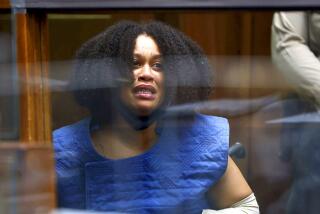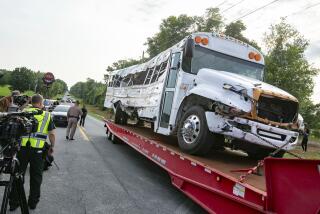Trash Truck Supervisor in a Limbo of Despair
- Share via
He has spent the week since the accident sedated on Prozac, passing the days watching mindless TV and getting beaten at chess by his 6-year-old grandson.
Banished from his job as a city maintenance supervisor since a malfunctioning trash truck from his yard rammed into a school bus, killing two third-graders, Dave Wear sits in his comfortable Canyon Country home, surrounded by handmade Christmas decorations.
But every time he closes his eyes, all he can see is that crippled school bus.
“I just want to stop calling myself a murderer,” Wear, 55, said in an interview with The Times, his first public comment since the tragedy.
“I just have that feeling when you lose something, that empty feeling,” Wear said Wednesday. “The word is ‘devastated.’ I’m devastated. . . . It just kills me that except for the stroke of a pen, this might not have happened.”
City officials placed Wear on paid administrative leave last Thursday, a day after the fatal accident, because he failed to keep truck No. 70 off the street, even though a driver had filed a report flagging a serious problem in the hydraulic compacting system. Officials are investigating the possibility that a design flaw in the trash truck, built by Ontario-based Amrep Corp., may have triggered the accident.
Admonished in writing by his supervisors not to talk to anyone about “anything regarding the events leading up to the accident,” Wear refused to discuss details of the accident itself or the repair shop’s handling of the truck. He would only reiterate what city officials have already said publicly about what happened that night: That he got busy, or distracted, and never transferred his note on the problem truck from one sheet to the other.
“Something caused this split-second lapse of concentration,” Wear said.
Randall C. Bacon, head of the General Services Department, which runs the repair shop, said Wednesday that the process appears to have broken down on Wear’s watch. “That’s what our preliminary investigation indicated, and we’re doing a more detailed investigation,” he said. The department is considering a range of actions against Wear, he said, from returning him to the job without reprimand to termination.
Bacon acknowledged that truck “holds” have probably been missed before, but he said: “The consequences of this one have been so severe, it’s almost unfair to some extent. . . . You’re dealing with 500 trucks that get out every morning. . . . To miss one [of the holds] is not totally unexpected, but the consequences just happened to be very drastic.”
Hours after the crash near the corner of Temple and Alvarado streets, city fleet director Alvin Blain rousted Wear, the night supervisor, from bed and ordered him back to the yard.
With other city workers, Wear looked at the truck, its hydraulic piston still protruding from its side. They also saw the bus, its ripped windows a reminder of how the rod had plunged into the heads of 8-year-olds Francisco Mata and Brian Serrano, who were killed.
“Believe me,” Wear said, “I’ll see the bus the rest of my life.”
After six years as a mechanic in the Army, Wear worked at a Pasadena shop building engines for race cars. He raced them, too, and still picnics once a year with some old-timers who have also been around the track.
Hired by the city of Los Angeles in 1977, Wear was promoted to supervisor in 1983, and earns about $52,000 a year. He has stuck with night shift, working past 1 a.m, in part because it pays about 5.5% more than the day shift.
This week, he began calculating pension possibilities. But, by his tally, there is nowhere near enough to get him through retirement should the accident trigger a premature end to his career.
“I worry about my family,” said Wear, whose mother-in-law, daughter and grandson all live with him. “How am I going to support my wife?”
Though Blain ordered him to sit by the phone from 8 a.m. to 5 p.m. daily, Wear said city officials have not contacted him since their brief interviews about the accident Dec. 6. Some of the guys from the shop have called to console him, but mostly, “It’s no fun, nobody talks to me.”
He has been avoiding television news, for fear of seeing reports on the accident. He picked up a newspaper Wednesday for the first time since the fatal crash.
Taking advice from his supervisors, Wear sought counseling after the accident, and came home toting the Prozac, anti-anxiety drugs and high-octane sleeping pills.
“I can take one of these at 7 and sleep until 11 the next day,” he said with a sigh. “It makes the days really short.”
In the Wear household, the stockings are hung on the mantel and knitted gingerbread men dangle from the chandelier, but the Christmas tree remains bare of ornaments. Wear said he gave his Christmas money to his two daughters and sent them out to do his gift shopping. His grandson has been practicing his handwriting at the dining room table with words such as “Rudolph” and “reindeer.”
“It hasn’t been easy on me emotionally--to see what happened to those children,” Wear said. “You find out what the word ‘alone’ means.”
Times correspondent Geoffrey Mohan contributed to this story.
* MECHANICAL PROBLEMS: Officials confirm a similar truck malfunction in August. B1
More to Read
Sign up for Essential California
The most important California stories and recommendations in your inbox every morning.
You may occasionally receive promotional content from the Los Angeles Times.













